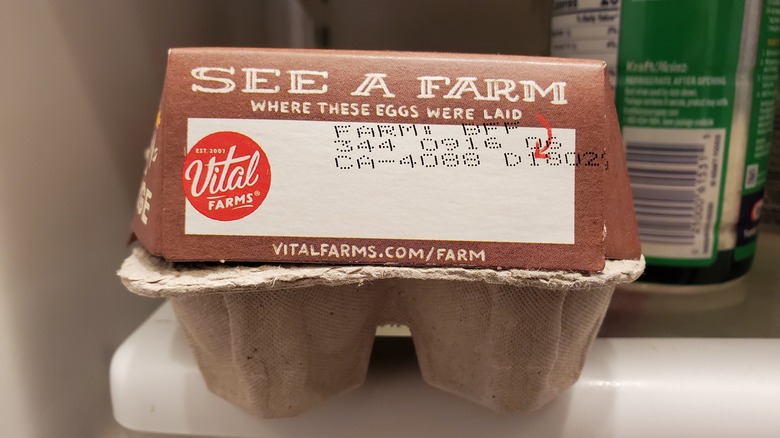What All Those Labels On Your Egg Carton Really Mean
Eggs have been an affordable staple for years, but recently, there have been some changes customers might have noticed. For one thing, the price of eggs seems to jump up and down fairly regularly these days, and when the prices are up, you want to make sure you're getting the best bang for your buck every time you buy a dozen. In the past, it seemed like the main decision anyone buying eggs had to make was whether to opt for white or brown, but even before the era of cage-free and pasture-raised eggs, terms like "Grade AA" and different sizes, as well as sell-by, expiration, and packed-on dates, were confusing some of us. What do these terms all mean? And what about things you're more apt to see now, like cage-free, free-range, and humane-certified?
There's a lot to parse through, but once you know what these terms really mean, it'll be a lot easier to select the right carton of eggs for your household at the grocery store. You'll be enjoying meringues, omelets, and egg-drop soup without the stress of trying to make sense of terms you were never able to decipher before.
Free range, cage-free, and more
These days it's more and more common to see egg cartons labeled with terms like free-range, cage-free, pasture-raised, and more, but what do these words actually mean?
Cage-free means that the hens aren't kept in cages, though they don't have access to the outdoors. The pro of this is that hens have room to move around, but some cons include more violence between hens and worse air quality, according to Eater. Free-range hens are supposed to be given access to the outdoors during their laying cycle, but farmers get to decide how much, or how little, time that may be. Then there's pasture-raised. This term isn't regulated by the U.S. Food and Drug Administration (FDA), but if your eggs are both labeled pasture-raised, and the carton bears the "Certified Humane" or "Animal Welfare Approved" label, it means that the farm that produced the eggs has 108 square feet of outdoor space allocated per hen in addition to barn space.
There are also labels that refer to the chickens' diets and medical care. The U.S. Department of Agriculture (USDA) says organic means the hens were fed organic food and are allowed to graze outdoors at least 120 days a year; vegetarian-fed means just what it sounds like; and hormone-free and no added antibiotics are basically meaningless at this point, because hormones for chickens are banned by the FDA, and antibiotics aren't used in chickens that will be used for eggs or meat anyway.
Best by dates, grades, and sizes
If you want to know how old your eggs are, or how long they'll last, you'll want to look for a few things. The University of Nebraska-Lincoln explains that the pack date is a three-digit code on the carton that signifies the date the eggs were packaged according to the Julian Date Calendar, which labels January 1 as 001 and gives every date the next digit up through December 31 with the label 365. Eggs are fresh for four to five weeks past this date. You might also be able to find a sell-by, best-by, or expiration date on the carton, though those labeling requirements vary from state to state.
Then there are egg grades. According to USDA standards, Grade AA eggs are considered the best, having the most uniform shape and high-quality yolks. Grade A eggs may have runnier whites but are still considered to be high-quality. Then there are Grade B eggs, which you're less likely to see in stores — they're often used to make liquid eggs and for commercial food production, and tend to have thinner shells that may be stained or blemished. Egg sizes, on the other hand, tell you how much the eggs in your carton weigh, with "Small" eggs weighing up to 1.75 ounces each, and "Jumbo" eggs 2.5 ounces or more. Larger eggs may be more expensive.
Buying eggs doesn't have to feel as nerve-wracking as taking a pop quiz, and now that you know what all of the terms on your egg cartons mean, it won't have to be.


